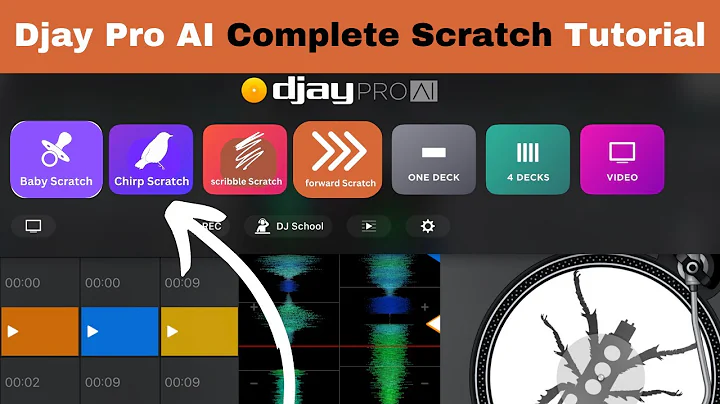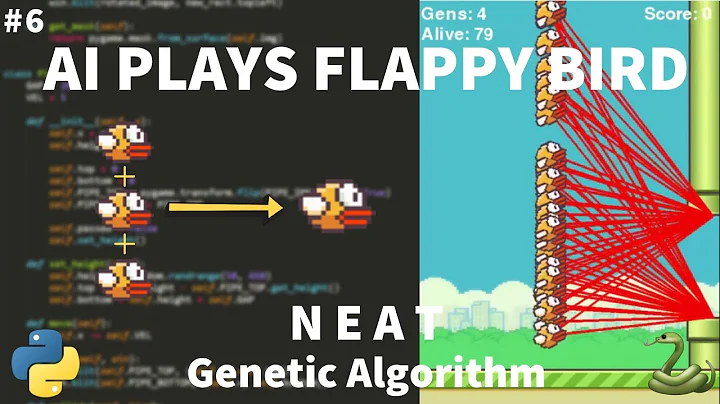Revolutionizing Mobile Robotics: CMU's Breakthrough in Open-World Manipulation
Table of Contents:
- Introduction
- The Challenges of Deploying Robots in Unstructured Environments
- Carnegie Mellon University's Breakthrough Open World Mobile Manipulation System
- How the Adaptive Learning Framework Enables the Robot's Learning Process
- The Remarkable Adaptability and Affordability of the System
- Impressive Results from Field Tests
- The Full Stack Approach of Carnegie Mellon's Mobile Manipulation System
- Google's DeepMind and the Path to Artificial General Intelligence
- Meta Learning and the Development of Universal Predictors
- The Implications of DeepMind's Breakthrough in Neural Networks
- Google's Gemini Advanced: A Revolutionary Step in AI Collaboration
- The Exciting Features of Gemini Advanced and Its Integration with Google Apps
- Google's Enhancements to Maps with AI-Powered Search
- The Potential of AI-Generated Answers in Web Traffic Dynamics
- Google's Caution and Future Plans for AI Search
- Conclusion
Carnegie Mellon University's Breakthrough in Mobile Robotics
In recent years, the field of robotics has witnessed significant advancements, with the development of robots capable of performing complex tasks in unstructured environments. Carnegie Mellon University (CMU) has taken a major step forward in this field by unveiling their breakthrough open world mobile manipulation system. This system addresses the long-standing challenge of deploying robots in real-world scenarios, where they need to interact with objects commonly found in homes and offices.
The Challenges of Deploying Robots in Unstructured Environments
Traditionally, robots have been limited to controlled environments, where their tasks were largely focused on basic object manipulation. However, the real world presents a wide array of challenges, especially when it comes to interacting with objects encountered in our daily lives, such as doors, cabinets, and refrigerators. These objects vary in size, Shape, and weight, making it difficult for robots to adapt and manipulate them effectively.
Carnegie Mellon University's Breakthrough Open World Mobile Manipulation System
To tackle these challenges, CMU has developed an open world mobile manipulation system that combines hardware and software solutions. The system starts with an Adaptive Learning framework, which allows the robot to learn from a small data set through behavior cloning. This process involves the robot replicating human actions to understand how to interact with objects.
How the Adaptive Learning Framework Enables the Robot's Learning Process
The Adaptive Learning framework enables the robot to learn initially from a small data set through behavior cloning. This process involves the robot replicating human actions to gain an understanding of how to interact with objects. However, the true test comes when the robot encounters objects outside its initial training. In these cases, the system shifts to online self-practice, allowing the robot to adapt and learn autonomously from its interactions with new objects.
The Remarkable Adaptability and Affordability of the System
One of the most remarkable aspects of CMU's mobile manipulation system is its adaptability. The system has shown impressive results in field tests, with a success rate improving from 50% to 95% following online adaptation. This adaptability showcases the system's ability to learn and adapt in real time, making it suitable for use in diverse unstructured environments.
Moreover, the affordability of CMU's system is worth highlighting. With a cost of around $25,000 USD, the researchers have developed a mobile manipulation hardware platform that is accessible for widespread use in various settings.
Impressive Results from Field Tests
To validate the effectiveness of CMU's mobile manipulation system, the researchers conducted a series of field tests across four buildings on the CMU campus. These tests involved the system interacting with 20 different articulated objects. The results were astonishing, with a success rate of 95% achieved in less than an hour of online learning for each object. These findings demonstrate the system's remarkable ability to learn and adapt in real-world scenarios.
The Full Stack Approach of Carnegie Mellon's Mobile Manipulation System
CMU's mobile manipulation system takes a full stack approach to address both the hardware and software challenges of operating in diverse real-world scenarios. The hardware components include a range of mini two agile X bases known for their stability and omnidirectional velocity control, combined with a high payload capacity. The manipulation tasks are handled by an X arm, known for its high payload capacity and cost-effectiveness. Together, these components create a versatile and robust platform for the robot's operations.
The system's brain is a Jetson computer that orchestrates real-time communication between the sensors, the base, the arm, and a server. Visual data is captured through a D435 Intel RealSense camera, providing RGB-D images. Additionally, a T265 Intel RealSense camera offers vital visual odometry for reinforcement learning trials.
Google's DeepMind and the Path to Artificial General Intelligence
While CMU's breakthrough in mobile robotics is impressive, the field of artificial intelligence (AI) is advancing rapidly in other areas as well. DeepMind, a subsidiary of Google, has made significant strides in the development of AI systems capable of performing a wide range of tasks.
Meta Learning and the Development of Universal Predictors
DeepMind's latest research focuses on meta learning, an approach that enables AI systems to rapidly assimilate new abilities from limited data sets. The team has incorporated a Solomonoff Induction inference system into neural networks via meta learning, harnessing the power of Universal Turing Machines (UTMs). This method allows AI models to adapt and master diverse tasks by constructing exceptional task distributions and encountering a variety of challenges.
This breakthrough in meta learning has the potential to propel AI systems towards the development of universal representations. The aim is to equip these systems with the ability to tackle an extensive range of problems, ultimately leading humanity towards the zenith of Artificial General Intelligence (AGI).
The Implications of DeepMind's Breakthrough in Neural Networks
DeepMind's breakthrough in neural networks is not without its challenges. While neural networks theoretically possess the capability for universal computation, practical training methods often constrain their potential. DeepMind's researchers have overcome these limitations by using conventional architectures such as transformers and LSTMs, focusing instead on creating an optimal training data protocol using UTMs.
This breakthrough opens up new possibilities for training neural models with data of universal complexity, enabling them to engage in transfer learning across domains. It has the potential to capture a vast repository of adaptable Patterns and transform the capabilities of future sequence models.
Google's Gemini Advanced: A Revolutionary Step in AI Collaboration
Google is also making significant strides in the field of AI, particularly in the area of collaboration. They have recently announced the launch of Gemini Advanced, an advanced tier that offers new features and streamlined Google AI Tools for collaborative capabilities.
The Exciting Features of Gemini Advanced and Its Integration with Google Apps
Gemini Advanced offers groundbreaking capabilities such as sophisticated coding assistance, logical reasoning, and nuanced instructions. This advanced tier is tailored for early adopters and individuals ready to harness the full potential of AI. It is poised to revolutionize creative collaboration by integrating with Google apps, allowing seamless harnessing of AI for tasks ranging from email composition to event planning, all through a user-friendly interface on mobile devices.
Google's Enhancements to Maps with AI-Powered Search
In addition to Gemini Advanced, Google has enhanced its Maps application with a new AI-powered search feature. This feature leverages AI models from the Gemini series to provide users with personalized suggestions based on their preferences. Users can ask for specific recommendations and receive tailored suggestions, including follow-up queries for related options. By considering factors such as photos, ratings, and reviews, the AI-powered search adapts to changes like weather conditions, providing Relevant alternatives.
Furthermore, Google is experimenting with integrating AI into its search offerings, particularly through the search generative experience. This ambitious project aims to provide AI-generated answers to search queries, potentially transforming web traffic dynamics. However, Google is proceeding with caution in the early stages of this development.
Conclusion
The advancements made by Carnegie Mellon University and Google's DeepMind are reshaping the field of robotics and artificial intelligence. CMU's breakthrough open world mobile manipulation system demonstrates the potential for robots to adapt and learn in unstructured environments. Meanwhile, DeepMind's research on meta learning and universal predictors paves the way for artificial general intelligence. Google's Gemini Advanced and AI-powered search features introduce new possibilities for collaboration and enhanced user experiences. These advancements highlight the remarkable progress being made in the field of AI and set the stage for future breakthroughs.
Highlights:
- Carnegie Mellon University unveils breakthrough open world mobile manipulation system for robots in unstructured environments.
- The Adaptive Learning framework allows the robot to learn autonomously from interactions with new objects.
- CMU's system shows remarkable adaptability and affordability, making it viable for widespread use.
- Impressive results from field tests demonstrate the system's ability to learn and adapt in real time.
- DeepMind's meta learning approach propels AI systems towards universal predictors and artificial general intelligence.
- Google's Gemini Advanced revolutionizes AI collaboration with sophisticated coding assistance and logical reasoning.
- AI-powered search enhancements in Google Maps provide personalized suggestions based on user preferences.
- Google's caution in the rollout of AI search reflects the early stages of development.
FAQ:
Q: How does CMU's mobile manipulation system learn to interact with new objects?
A: CMU's system utilizes an Adaptive Learning framework, which allows the robot to learn from a small data set through behavior cloning. It replicates human actions and can autonomously adapt to new objects through online self-practice.
Q: What are the benefits of DeepMind's meta learning approach?
A: DeepMind's meta learning enables AI systems to rapidly assimilate new abilities from limited data sets. This approach, combined with Universal Turing Machines, has the potential to create universal predictors and propel AI towards artificial general intelligence.
Q: What are the features of Google's Gemini Advanced?
A: Gemini Advanced offers sophisticated coding assistance, logical reasoning, and nuanced instructions for enhanced collaboration. It integrates with Google apps, allowing users to seamlessly harness AI for various tasks.
Q: How does AI-powered search enhance the Google Maps experience?
A: AI-powered search in Google Maps generates personalized suggestions based on user preferences. It considers factors like photos, ratings, and reviews to provide tailored recommendations, adapting to changes such as weather conditions.
Q: What is the implication of Google's caution in the rollout of AI search?
A: Google is proceeding carefully with AI search, as it is still in its early stages. While AI-generated answers have the potential to transform web traffic dynamics, further development and testing are needed before wider rollout.
Resources:


 < 5K
< 5K
 65.96%
65.96%
 19
19


 < 5K
< 5K
 11
11


 41.4K
41.4K
 54.44%
54.44%
 50
50


 < 5K
< 5K
 12
12


 < 5K
< 5K
 0
0


 < 5K
< 5K
 0
0


 < 5K
< 5K
 2
2






































